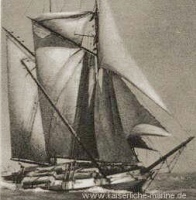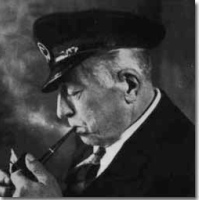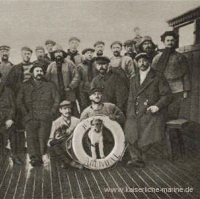Here's another special piece I did for the great folks at the Aussie site
The Cud.
This time it's about the incredible Felix von Luckner, the The Benevolent Sea-Devil.
The year: 1917, the height of the War To End All Wars, sadly now referred to as World War 1. The Place: The Atlantic Ocean. You: the captain of an allied merchant ship carrying coal from Cardiff to Buenos Aires.
Then, like a ghost from the distant past, a ship appears: a beautiful three mastered windjammer flying a Norwegian flag. Staggered by this hauntingly lovely anachronism you think nothing of it coming alongside – it was common, after all, for friendly ships to want to synchronize their chronometers – until, that is, the ship's Norwegian flag is quickly replaced by the German eagle and the captain, in amazingly polite terms, backed up by guns that have mysteriously appeared in the windjammer's gunwales, explains that your ship is now his.

And so you have been captured by the Seeadler ("Sea Eagle" in German), captained by Felix von Luckner, or, as he was known by both enemies as all as allies, the Benevolent Sea-Devil.
Some people's lives are so broad, so wild, so amazing that they simply don't seem real. The stuff of Saturday matinees? Sure. But real, authentic and true? Never! But if even half of Felix von Luckner's life is true – and there's no reason to really doubt any of it – then he was truly a broad, wild, and utterly amazing fellow.
Born in 1881, in Dresden, Felix ran away from home at 13. Stowing away on a Russian trawler, he fell overboard – rescued, so the story goes, by grabbing hold of an albatross, the bird's flapping wings acting as a signal to a rescue party.
Making his way to Australia, Felix tried a number of – to put it politely – odd jobs: boxer, circus acrobat, bartender, fisherman, lighthouse keeper (until discovered with the daughter of a hotel owner), railway worker, kangaroo hunter, and even had a stint in the Mexican army. During all this Felix also became a notable magician and a favorite entertainer to no less than Kaiser Wilhelm himself.

Making his way back to Germany he passed his navigation exams and served aboard a steamer before getting called to serve in the Navy on the SMS Panther.
Which brings us to that War That Was Supposedly The End To All Wars. Even though it was fought with steel and oil, the German's outfitted a number of older ships as raiders -- hidden guns, more powerful engines and the like – and sent them out to harass allied shipping. Most of them were, to put it politely, a failure. But then there was the Seeadler, under the command of Felix von Luckner.
During the course of the war Felix sank or captured no less that 16 ships – a staggering amount. What’s even more staggering is how Felix did it, and that he did it with grace, honor, and even a certain kindness. You see, while the Seeadler took out those ships it, during it's entire campaign, did it at the cost of only single human life. Most of the time the scenario went just as it did with your merchant ship carrying coal from Cardiff to Buenos Aries: the Seeadler would approach a target, raise it's German eagle and that would be that: the crew and cargo would be captured and the ship scuttled. Sometimes she'd fire a shot to two to get her pint across that she was serious, but it wasn't until the British ship, Horngarth, that anyone had actually been killed. Tricked into thinking they were investigating a stricken ship – Felix had actually used a smoke generator – the captured Horngarth had refused to stop broadcasting a distress signal. A single shot took out the radio but unfortunately killed the operator. Felix von Luckner, though, gave the man a full military funeral at sea and even went as far as to write the poor man's family telling them that he had died with honor.
To give you even more evidence that Felix von Luckner more than deserved the "benevolent" in his "Benevolent Sea-Devil" nickname he treated everyone he captured with dignity and respect: captured sailors were paid for their time while on his ship and officers ate with him at his captain's table. When the Seeadler got too packed with prisoners, by this time more than 300, Felix captured the Cambronne, a little French ship, cut down her masts and let all his prisoners go with the understanding that if they happened to get picked up before making land they wouldn't tell where the Seeadler was going.

Respecting Felix's honor they didn't.
Alas, the Seeadler's rule of the Atlantic had to end sometime – but even that just adds to the broad, wild, and utterly amazing life of Felix von Luckner. With the British – and now the Americans – hot on her tail, Felix decided to take a quick barnacle-scraping break from piracy by putting the Seeadler into a bay on Mopelia, a tiny coral atoll. Now stories here conflict a bit – Felix always claimed that a rogue tsunami was to blame – but I think the more-standard explanation that the crew and prisoners of the Sealer were simply having a picnic on the island when their windjammer drifted aground.
Taking a few of his men in some long boats, Felix sailed off towards Fiji intending to steal a ship and come back for the Seeadler. Through a series of incredible adventures – including claiming to be Dutch-Americans crossing the Atlantic on a bet – the Sea-Devil was himself tricked into surrendering by the Fijian police who threatened, after becoming suspicious of one of Felix's stories, to sink his boat with an actually-unarmed ferry. By the way, the remaining crew and prisoners of the Seeadler had their own adventures, leading eventually to the escape of the prisoners and the capturing of the Seeadler's crew.
But even a Chilean prison camp wasn't the end for Felix, or not quite the end. Using the cover of putting on a Christmas play, he and several other prisoners managed to steal the warden's motorboat and then seize a merchant ship. Alas, Felix's luck ran out when they were captured again and spent the rest of the war being moved from one camp to another.
But rest assured the story doesn't end there.

Far from it: after writing a book about his various adventures, Felix von Luckner toured the world entertaining audiences about the Seeadler – as well as demonstrating his strength by tearing phone books in half and bending coins between thumb and forefinger.
While, with the rise of Hitler, some people thought of Felix as a apologist, the captain had no love for the Nazi's – especially since the German government had frozen his assets when he refused to renounce the honorary citizenships and honors he'd received during his travels.
But the story of Felix von Luckner still isn't over. Retiring to the German town of Halle, he was asked by the mayor to negotiate the town's surrender to the Americans. While he did this, earning not only the respect of the Americans and the gratitude of the citizens, his reward from the Nazi's was to be sentenced to death. Luckily, Felix managed to flee to Sweden where he lived until passing away at the age of 84.
War is horror, war is pointless death, and war is needless suffering. But because of men like Felix von Luckner, war can also show the good, noble side of man – and that some men can remarkably earn the respect of friend and enemy alike.









 Respecting Felix's honor they didn't.
Respecting Felix's honor they didn't. Far from it: after writing a book about his various adventures, Felix von Luckner toured the world entertaining audiences about the Seeadler – as well as demonstrating his strength by tearing phone books in half and bending coins between thumb and forefinger.
Far from it: after writing a book about his various adventures, Felix von Luckner toured the world entertaining audiences about the Seeadler – as well as demonstrating his strength by tearing phone books in half and bending coins between thumb and forefinger.
